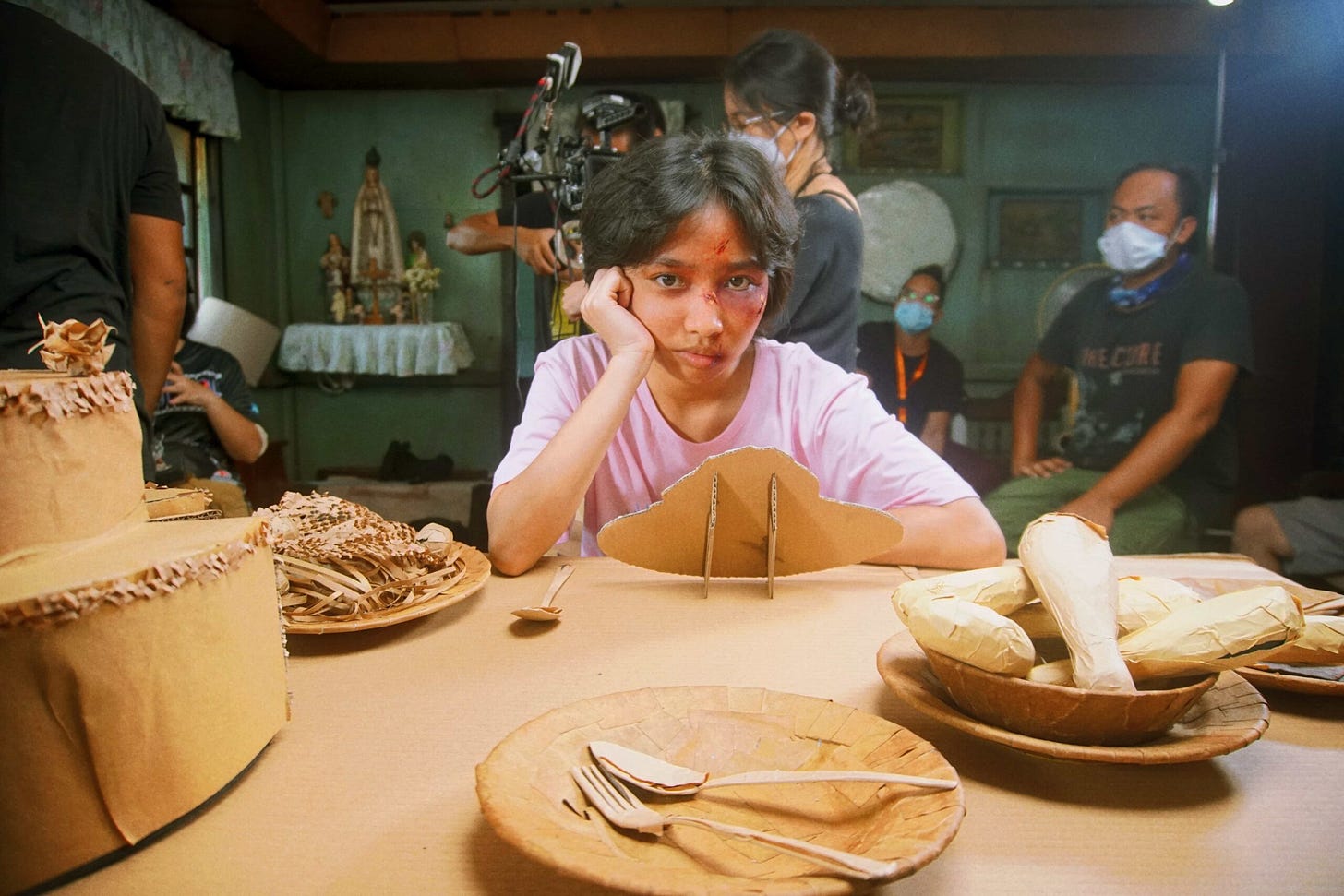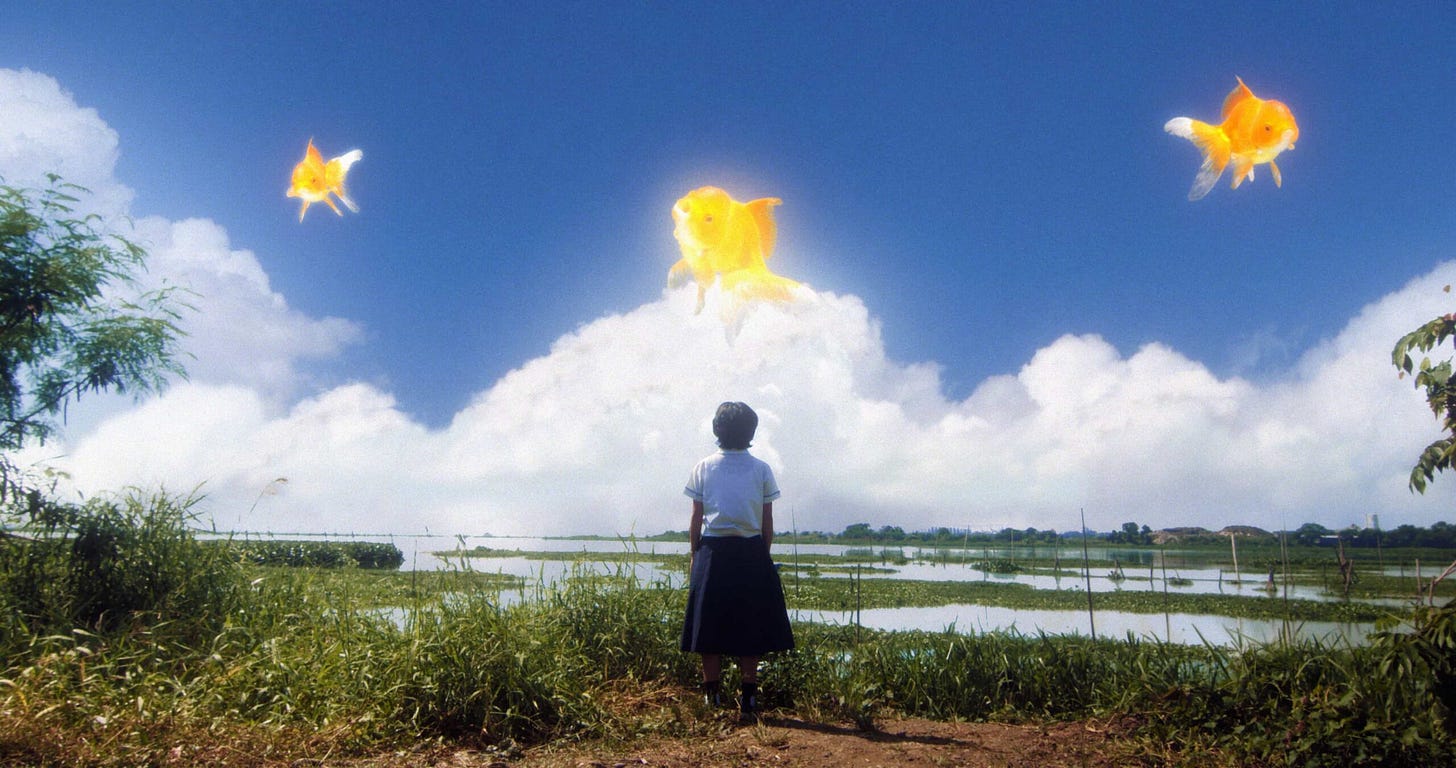February 2024: sardines & catfish
This month is all about fish. A poem titled "Sardines" and a short film review for Hito (2023) Dir. Stephen Lopez
Sardines
(Better read on a Desktop)
It’s the early hours of the morning,
somewhere between four and six a.m.
and we’ve just landed,
having left our home in the Philippines (Motherland)
Mother lands with a world
weary thud on the sofa and answers
the grumbling bellies of her babies
by pursing her lips in a point
to where the sardines live.
“Even when there is nothing in the kitchen there will always be a can of sardines”
Leaving our luggage at the doorway
our bodies move in synchronisation
to put food on the table.
I wash the rice
and measure out the water with an index finger.
Baby brother opens the cans
with the focused pride of having a purpose.
Mother chops
the sole sad onion at the bottom of the basket.
Father fries
it all together.
And just like that there is a meal
and our empty, one bedroom Tooting flat turns
into a land of abundance.
That was the first time I learnt that sardines were synonymous with safety.
A promise of abundance spoken in eight words:
“There will always be a can of sardines,” my mother said.
I am twenty-seven years old,
and returning to the motherland for the first time in ten years.
I hear there is a fishing village
on the south side
of one of the seven-thousand islands
where the locals purse their lips in a point
to where the sardines live.
Swimming amongst them my lungs are on fire
(and I can tell the guide knows I lied
about being a good swimmer)
but I feel this overwhelming sense of safety and I think of my mother.
She is twenty-seven years old and returning
to her one bedroom Tooting flat
alone in a city of an estimated ten million bodies moving in synchronisation
Mother lands with a world weary thud on the sofa (bed)
Tonight she will eat sardines for the seventh night in a row. It is her answer
to the grumbling bellies of the babies she left back home.
Chest tight with the relentless tugging of sacrifice she says
“Even when there is nothing in the kitchen there will always be a can of sardines”
That was the first time she learnt that sardines were synonymous with scarcity.
A struggle for abundance spoken in 8 words:
“There will always be a can of sardines”
The other day my mother asked me “Were you happy as a child?”
In a family where the words
“I care”
“I love you”
are coded tokens rationed out as if the habit of saving
counted for pennies
as well as words of affirmation.
I was winded by that question: “Were you happy as a child?”
I was struck by a russian doll of realisations
starting with what she was really asking me:
“Do you feel it? The life of abundance I promised you”
And then I saw it all play out on her face.
Seven-thousand islands and rich biodiversity
turns into six different species of sardines
turns into a land of abundance
turns into a land up for grabs
turns into a land of scarcity
turns into a search for opportunity
turns into a sacrifice
turns into reunion
turns back into abundance.
“I was happy when we ate sardines” I said
Film Review: Hito (2023) Dir. by Stephen Lopez
When Marcos Jr. was elected into the Philippine presidency in the summer of 2022, a younger cousin reached out to me with a link to a Google Drive folder. It was filled with all sorts of digitised archival material detailing the various crimes of the Marcos regime from 1965 to 1986. There were films, court mandates, articles, accounts of human rights violations, propaganda comics and more. I was impressed by the collection. I was even more impressed by the rebellious forward-thinking from my kid cousin and her peers. I was told the collection was being forwarded to diasporic Filipinos worldwide for download and safe-keeping with the not-so-unrealistic idea that they may mysteriously disappear from public access with a Marcos back in the seat of power. London is 7,000 miles away from Manila, making me very much out of reach from the political stirrings of my home country, and yet from where I was standing you could hear pockets of youth in revolt. Silently, they were shouting '“You will not control the narrative”
Hito (2023) directed by Stephen Lopez screened as part of the London Short Film Festival last month. The absurdist dystopian sci-fi took its deserved place in the famous WTF! programme and was included in competition as an International contender. Having made its world-premiere in the 73rd edition of Berlinale and winning the Vienna Short Film Award for Best Film for the FIDO Fiction and Documentary – International Competition category, Lopez’s electrifying short had already been gracing the eyes of audiences worldwide when it placed as runner up in LSFF’s International Competition. The story, set against the backdrop of an apocalyptic version of provincial Philippines, centres on Jani a teenaged-girl tasked with the chore of buying a fish for the family’s dinner. While following orders Jani comes across a floating lap dog who steals her fish (Wait, it gets more bizarre) To rectify the situation the dog’s owner gifts her with a pet catfish (“Hito” in Tagalog) and sends her on her merry way. From here the film dissolves into a glitchy fever-dream of fragmented realities and chaos-driven surrealism. Lopez’s use of visual and practical effects, with the occasional flashes of photography from Marcos’ era of martial law, imbues Hito with a powerful and yet playful voice of political dissent. The Vienna Shorts jury said that Hito gives a “biting and humorous commentary on an authoritarian state” through its “visual excess and multimedia playfulness.” With the help of her catfish companion, who we learn is charmingly named “Kiefer”, Jani resists the manipulations of her oppressive ruler in an interrogation scene at the film’s apex.
Hito is a short film that is vibrant and alive with the intense hues of its colour grading and its jolting editing style. The energy could be likened to the adrenaline palpable in the videos I’ve seen of college students storming Malacañang (the Philippines’ presidential residence) at the collapse of the first Marcos regime. But in the age of misinformation and mirage-like truths, it more closely reminded me of my cousin, her friends and their collective courage in saying “You will not control the narrative - again”



